HAMDEN, Conn. — On Oct. 19, an email was sent by Residential Life informing all first-year residents of The Ledges dormitory that anyone who does not live in the building is prohibited from entering until Nov. 2.
The ban, which includes Quinnipiac students and visitors, with the exception of students’ parents, was put into effect due to “persistent instances of disrespect towards our community and improper utilization of restroom facilities,” according to an email sent to Ledges residents.
“Since August there has been a progressive increase of vandalism within the building,” said Thomas B. Rouse, the Director of Residential Life. “And then came a point where we had to say, enough is enough with this. And then that’s where the restriction for guests came into place.”

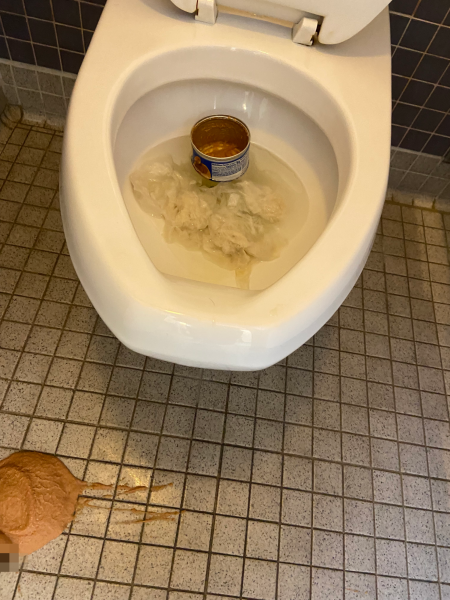
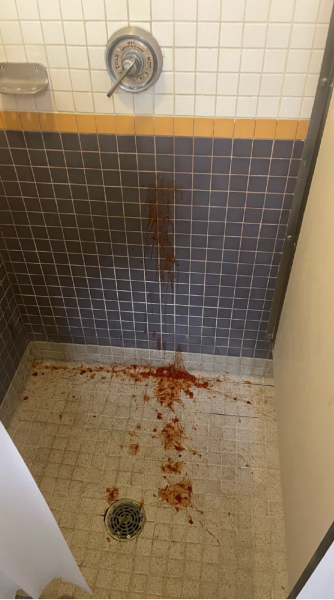
Vandalism has been a topic of discussion around Ledges’ first-year class. Students told Q30 that there have been stains in hallways from spilt alcohol, air vents being caved in, ceiling tiles being broken, and vomit on the floors and toilets.
“Someone managed to burn into [a] cork board a cartoon penis,” said Lucas Melo, a first-year medical microbiology and immunology major who lives in The Ledges. “My RA, he said that someone had put something sticky in his little QCard slot so he couldn’t get into his room, and he had to call public safety.”
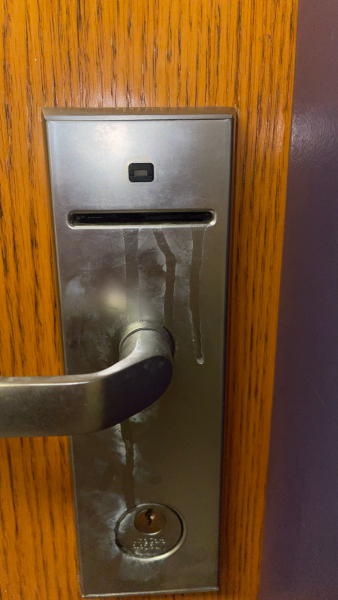
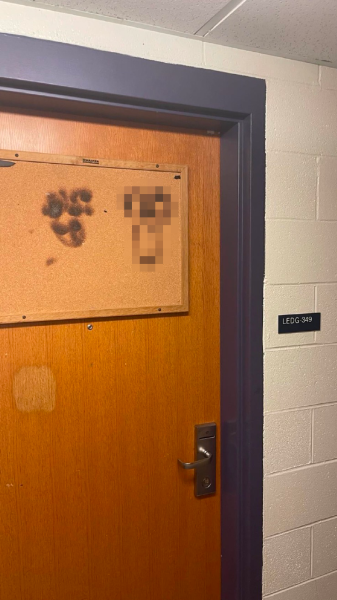
Q30 has also obtained texts from resident assistants in Ledges, showing raw eggs being thrown in the hallways and dorm doors having their decorations ripped off and spit on.
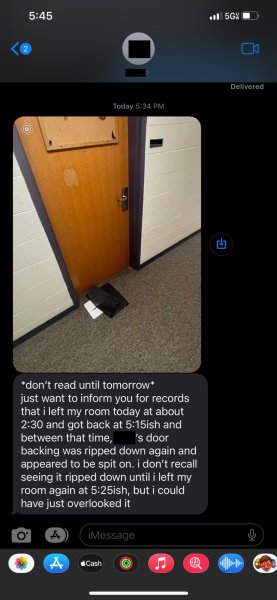
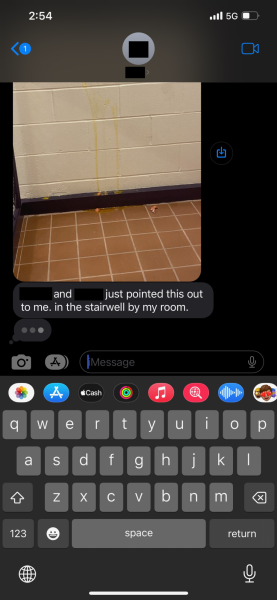
According to Residential Life, these damages are estimated to have cost the school thousands of dollars to clean and repair. “The cleaning crew has to spend extra time, they have to steam clean parts of the bathrooms, it’s not fair to them,” said Melo. “They have a 2 hour window of cleaning just our bathroom because of how much there is to clean.”
While vandalism in Ledges has been an issue for years, the extreme levels now and the subsequent building closure is not something that’s been seen in recent years, and it’s very reminiscent of an old TikTok trend.
The “devious lick” challenge started off as a trend in the fall of 2021 where kids would show off items that they stole, or “licked,” from their school. Eventually it started to spiral, with the licks increasing to paper towel dispensers and ceiling tiles. But after only 2 weeks since going viral, students were getting arrested and faced criminal charges due to vandalism.
“At my high school one of the most prominent things you’d see is paper towel and soap dispensers getting torn off,” said Oscar Lin, a first-year mechanical engineering major who’s high school was affected by the trend in 2021, and who currently lives in Ledges. “There were also a handful of incidents where students literally wiped feces on the walls and mirrors…”
Lin goes on to explain that his high school shut down all of the boys bathrooms at his school, and stationed hall monitors outside the remaining ones to unlock bathrooms for students and to police the amount of kids outside.
If it seems that there’s a lot of similarities between devious licks and Ledges vandalism, it’s hardly a coincidence. The devious lick trend was most popular among high school teenagers, many of whom are now entering their first-year in college.
However, the one factor that is consistent with these acts, and what could help to give a sociological insight as to why vandalism is such a common “trend,” is the fact that a large majority of the incidents are perpetrated by boys. “Some of the things I have experienced in the girls bathrooms include… overall just a lack of respect for taking care of the area,” said Erin Swearingen, a first-year industrial engineering major who lives in Ledges. “Both are very unsanitary but it seems like the boys’ bathrooms are just generally worse.”
Now, this is not to say that men are inherently violent, that video games make them that way, or anything else older generations say about “kids these days.” Instead, it’s clear that the issue runs much deeper.
Violence surrounds people from a very early age, and even when it’s played for laughs or displayed subconsciously in the media, it could end up reaffirming learned behaviors. “This is not to say that men are the only ones exposed to violence,” said Rhys Hall, an instructor at Quinnipiac who currently teaches a Women and Gender Studies course on Masculinity. “But men are often endorsed to partake in these actions to get reinforcement by the reaction of other boys.”
‘Destructive behavior,’ a term Hall uses to refer to when energy naturally builds up and requires an outlet, is not inherently bad. It’s the reason why every child’s birthday party has a piñata, or why you can’t throw away bubble wrap without popping just a few. It’s also used in activities such as hunting, as well as physical sports.
“There’s a level of violence and roughhousing that I think should be acceptable for boys in their socialization. I think it becomes a problem when we aren’t finding ways to foster that to be done in a nondestructive way,” said Hall. “Playing fighting games and getting worked up with each other, dodgeball, football… those are contact sports that involve physical contact and energy being burned along with a group that you know wants to burn energy as well and has your best interest in mind.”
While having an outlet for destructive behavior is beneficial, it’s clear that the situation in Ledges cannot be so easily fixed. When COVID-19 caused a near-global lockdown, it took many young kids away from being able to socialize in-person and experience a school environment during pivotal years for emotional development. Their primary source of social contact was the internet, which, when students were allowed back in-person at schools in the fall of 2021, gave way for the spiraling of devious licks in an attempt to compete for attention online.
Negative destructive behavior had existed before COVID, of course, but the pandemic and student’s reliance on social media only elevated its prominence. “We are now dealing with the first transition of high school students going into college that missed the majority of their high school years,” said Hall. “When I was growing up, you had a flip phone. The only people that saw [the vandalism] were people that were in the bathroom …but nowadays, if I light a bathroom on fire or I destroy things, I can record that and I can get the algorithm to get me on the front page.”
Residential Life has also been sending emails to Ledges residents, telling them to stop the vandalism and to report anyone witnessed causing destruction. One of the emails also included a link to a folder containing photos of vandalized bathrooms. While this was done in an attempt to make students stop, it could ultimately have the opposite effect.
“If I now know that everyone else in the dorm has to pay for the destruction that I am not being targeted for, now I’m laughing at the fact that I’m causing you discomfort, and I feel like some type of sleuth who’s getting away with this,” Hall adds.
Hall also empathizes with students living in Ledges who have to deal with this behavior. “The last thing I want for these kids to be is to be suspended or expelled because of their actions. But I also know for the other students there in the dorm, they have to deal with the repercussions of those actions.”
In terms of what can be done to help divert these acts, punishment isn’t always the answer. Of course, while students who have committed property damage in Ledges will most likely receive some sort of discipline and restitution from the university, it shouldn’t be the go-to for destructive behavior. Punishing minor outbursts only hurts adolescents, and can cause them to act out more in the future. However, it is not the sole responsibility of people with authority to correct.
The students who live in Ledges are typically 17-19 years old, and can recognize right from wrong. Not having a proper outlet for themselves isn’t an excuse to cause thousands of dollars in property damage. It is instead a problem that they need to find a solution for, in a way that doesn’t break the law. Having these healthy outlets will only benefit them, as well as their peers who will be able to comfortably use the bathrooms again.
Until then, vandalism in the Ledges continues, and the building remains off limits for all non-residents and guests until Thursday, November 2nd.
Q30 News will provide more updates as this story continues.







